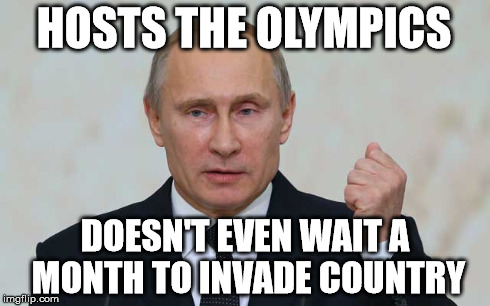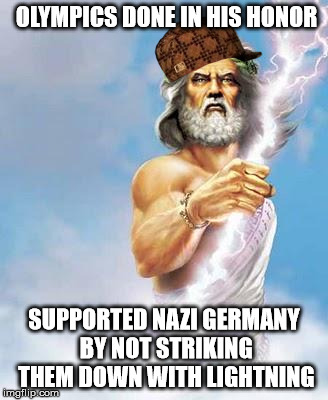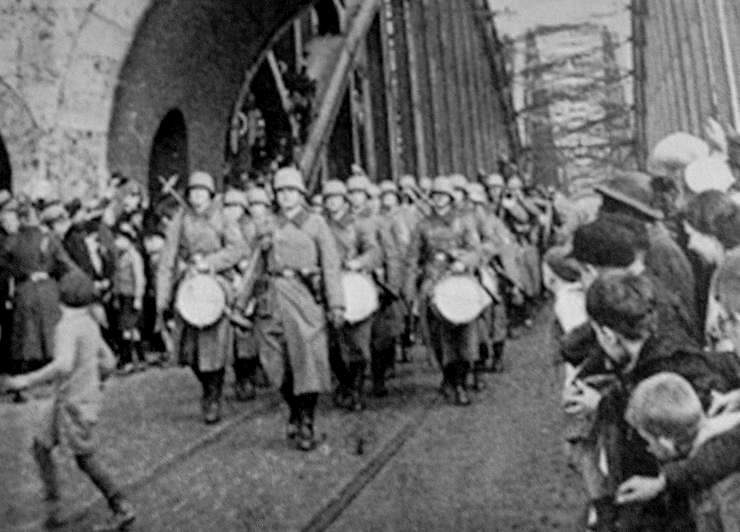Ladies and Gentlemen of the German Reichstag! By agreement with the Reich Government, today the National Socialist German Workers Party and the German National Peoples Party have presented to you for resolution a notice of motion concerning a Law for Removing the Distress of Volk and Reich. The reasons for this extraordinary measure are as follows: In November 1918, the Marxist organizations seized the executive power by means of a Revolution. The monarchs were dethroned, the authorities of Reich and Länder removed from office, and thus a breach of the Constitution was committed. The success of the revolution in a material sense protected these criminals from the grips of justice. They sought moral justification by asserting that Germany or its government bore the guilt for the outbreak of the War.
This assertion was deliberately and objectively untrue. In consequence, however, these false accusations in the interest of our former enemies led to the severest oppression of the entire German Volk, and the violation of the assurances given to us in Wilsons Fourteen Points then led to a time of boundless misfortune for Germany, that is to say the working German Volk.
All the promises made by the men of November 1918 proved to be, if not acts of intentional deception, then no less damnable illusions. The achievements of the Revolution were, taken in their entirety, agreeable for only the smallest of fractions of our Volk, but for the overwhelming majority, at least insofar as these people were forced to earn their daily bread by honest work, they were infinitely sad. It is understandable that the survival instinct of those parties and men guilty of this development invents a thousand euphemisms and excuses. An objective comparison of the average outcome of the last fourteen years with the promises once proclaimed is a crushing indictment of the responsible architects of this crime unparalleled in German history.
In the course of the past fourteen years, our Volk has suffered deterioration in all sectors of life, which could inconceivably have been greater. The question as to what, if anything, could have been worse than in these times is a question which cannot be answered in light of the basic values of our German Volk as well as the political and economic inheritance which once existed.
In spite of its lack of mobility in political feelings and positions, the German Volk itself has increasingly turned away from concepts, parties, and associations which, in its eyes, are responsible for these conditions.
The number of Germans who inwardly supported the Weimar Constitution in spite of the suggestive significance and ruthless exploitation of the executive power dwindled, in the end, to a mere fraction of the entire nation.
Another typical characteristic of these fourteen years was the fact that- apart from natural fluctuations-the curve of developments has shown a constant decline. This depressing realization was one of the causes of the general state of despair. It served to promote the insight into the necessity of thoroughly rejecting the ideas, organizations, and men in which one gradually and rightly began to recognize the underlying causes of our decay.
The National Socialist Movement was thus able, in spite of the most horrible oppression, to convert increasing numbers of Germans in terms of spirit and will to defensive action. Now, in association with the other national leagues, it has eliminated the powers which have been ruling since November 1918 within a few short weeks and, by means of a revolution, transferred public authority to the hands of the National Government. On March 5, the German Volk gave its approval to this action.
The program for the reconstruction of the Volk and the Reich is determined by the magnitude of the distress crippling our political, moral and economic life.
Filled with the conviction that the causes of this collapse lie in internal damage to the body of our Volk, the Government of the National Revolution aims to eliminate the afflictions from our völkisch life which would, in future, continue to foil any real recovery. The disintegration of the nation into irreconcilably opposite Weltanschauungen which was systematically brought about by the false doctrines of Marxism means the destruction of the basis for any possible community life.
The dissolution permeates all of the basic principles of social order. The completely opposite approaches of the individuals to the concepts of state, society, religion, morality, family, and economy rips open differences which will lead to a war of all against all. Starting with the liberalism of the past century, this development will end, as the laws of nature dictate, in Communist chaos.
The mobilization of the most primitive instincts leads to a link between the concepts of a political theory and the actions of real criminals. Beginning with pillaging, arson, raids on the railway, assassination attempts, and so on-all these things are morally sanctioned by Communist theory. Alone the method of individuals terrorizing the masses has cost the National Socialist Movement more than 350 dead and tens of thousands of injured within the course of a few years
For years Germany has been waiting in vain for the redemption of the promise to disarm given us by the others. It is the sincere desire of the National Government to be able to refrain from increasing the German Army and our weapons insofar as the rest of the world is also finally willing to fulfill its obligation of radically disarming. For Germany wants nothing except equal rights to live and equal freedom.
To deal with the economic catastrophe, the following is necessary: 1. an absolutely authoritarian leadership at home to create confidence in the stability of conditions; 2. safeguarding peace on the part of the major nations for a long time to come and thus restoring the confidence of the people in one another; and 3. the final triumph of the principles of common sense in the organization and leadership of the economy as well as a general release from reparations and impossible liabilities for debts and interest.
The illegal state of unilateral disarmament and the resulting national insecurity of Germany cannot last any longer.
For this reason we feel particularly grateful for the appreciative warmth which has greeted Germanys national uprising in Italy. We wish and hope that the concurrence of spiritual ideals will be the basis for a continuing consolidation of the friendly
relations between the two countries.
Similarly, the Reich Government, which regards Christianity as the unshakable foundation of the ethics and morality of the Volk, places great value on friendly relations with the Vatican and attempts to develop them. We are filled with a feeling of empathy for the troubles and distress of our Brudervolk in Austria. In all its doings, the Reich Government is conscious of the connection between the fate of all German tribes. The attitude toward the other individual foreign powers is evident from what has already been said. But there as well, where the mutual relations are already encumbered with difficulties, we shall endeavor to reach a settlement. However, the differentiation between victor and vanquished can never be the basis of an understanding.
We are nonetheless of the conviction that a settlement of this sort in our relations to France is possible if both governments really attack the problems confronting them with farsightedness. In regard to the Soviet Union, the Reich Government is determined to cultivate friendly relations which are productive for both parties. The Government of the National Revolution above all views itself capable of such a positive policy with regard to Soviet Russia. The fight against Communism in Germany is an internal affair, in which we will never tolerate outside interference. The national political relations to other powers to which we are related by mutual interests will not be affected by this. Our relationship with the other countries shall continue to warrant our most earnest attention in future, in particular our relationship to the major countries overseas, with which Germany has long been allied by friendly ties and economic interests.
We have particularly at heart the fate of the Germans living outside the borders of the Reich who are allied to us by language, culture, and traditions and who fight hard to retain these values. The National Government is resolved to use all the means at its command to support the rights internationally guaranteed to the German minorities.
However, the Government is just as determined as it is prepared to accept a notice of rejection and thus a declaration of resistance. May you, Gentlemen, now choose for yourselves between peace or war!













